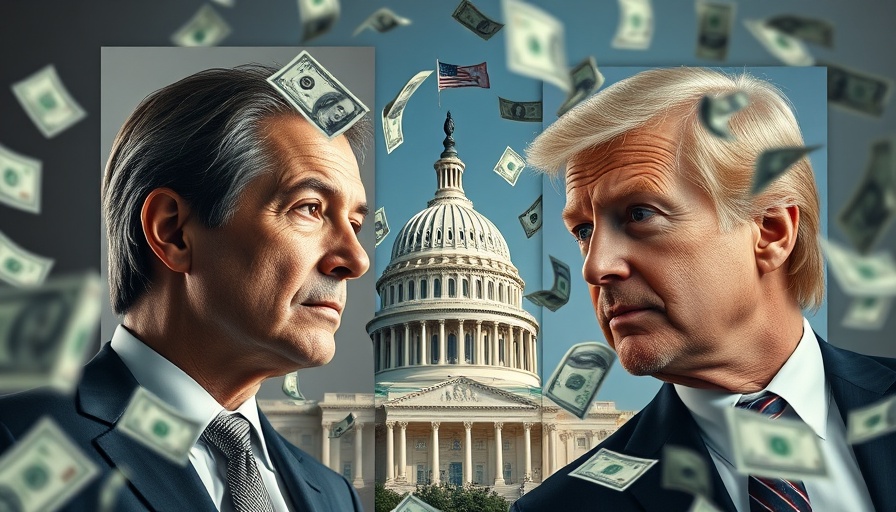
The Fragile Coalition: Trump and the House's Stopgap Bill
On Tuesday, the House of Representatives successfully passed a Trump-backed bill aimed at averting a government shutdown. The measure, which passed narrowly by a vote of 217 to 213, underscores not only the deep divisions within the legislature but also the heightened stakes that have come to define American politics. Just one Republican, Thomas Massie of Kentucky, voted against the bill, while Democrat Jared Golden from Maine crossed party lines to support it, illustrating a moment of rare bipartisanship amid widespread partisan opposition.
What’s at Stake? Funding and Federal Powers
The bill is a stopgap measure designed to fund the government through the fall while implementing $13 billion in cuts to non-defense spending, a move that has drawn considerable ire from Democrats who argue that it disproportionately affects vulnerable populations. In contrast, the legislation boosts military funding, aligns with Trump’s broader agenda of limiting federal spending, and retains a freeze on IRS funding—a move long-championed by Republican leaders. As Congress faces a tight deadline, the passage of this bill may set the stage for intense negotiations within the Senate, where Democrats hold a slim minority and will need to cooperate with GOP senators to avoid a government shutdown.
A Look Ahead: The Senate's Stance and Potential Showdown
Senate Democrats are now facing pressure to decide whether to support the House’s bill or risk a shutdown, which could have chaotic implications for millions of Americans relying on federal services. With Senator John Fetterman of Pennsylvania suggesting a possible willingness to consider the bill—which he believes is necessary to avert “chaos”—and other Senators voicing hesitations, the leadership must tread carefully. They need at least eight Democratic votes to pass the legislation, particularly with Republicans gearing up for a robust defense of the bill.
Pressure from Within: The GOP Dilemma
House Speaker Mike Johnson's success is not just a testament to his leadership but also reveals the complexities within the GOP as it navigates Trump's shadow. With pressure mounting from various factions, including ultra-conservatives and moderates, future calls for party unity will hinge on the outcome in the Senate. Vice President JD Vance's comments underscoring the risks of failure by suggesting Republicans could take the blame if a shutdown occurs exemplifies the heightened anxiety among GOP members.
Diverse Perspectives: A Divided Senate and Impacts Beyond Politics
For Democrats, opposition to the bill runs deeper than mere politics; it invokes broader concerns regarding social spending cuts that directly impact constituents. This divide could spell significant trouble for Democrats, especially if they appear ineffective in staving off perceived threats to public welfare just ahead of elections. The internal debates highlight the growing expectations from voters, who are increasingly voicing discontent with partisan gridlock, illustrating how ongoing issues, such as economic stability and healthcare access, weave into the fabric of political decision-making.
Implications for American Politics: Viewing the Bigger Picture
This showdown in Congress is not simply about funding; it serves as a window into the changing political landscape in the U.S. Polls indicate that public tolerance for shutdowns is waning, and there is an increasing demand for a government that functions efficiently. As lawmakers prepare for a fall recess, the resolution (or lack thereof) of this funding bill could come to define the narratives heading into the next electoral cycle, particularly as parties gear up to showcase their effectiveness and alignment with voter priorities.
Final Thoughts: Navigating Leadership in Turbulent Times
The tenuous approval of the Trump-backed stopgap bill is a critical moment not just for funding but for Republicans who must balance their priorities with growing public concern. As this story unfolds, the need for effective governance and cooperation transcends party lines, emphasizing the onus on lawmakers to deliver on promises even amid relentless political factions. The ramifications of this bill will impact many, marking a pivotal chapter in an already eventful congressional session.
For continuous updates and in-depth analysis of national news impacting everyday life, ensure you stay engaged with reputable news sources.
 Add Element
Add Element  Add Row
Add Row 



 Add Row
Add Row  Add
Add 


Write A Comment